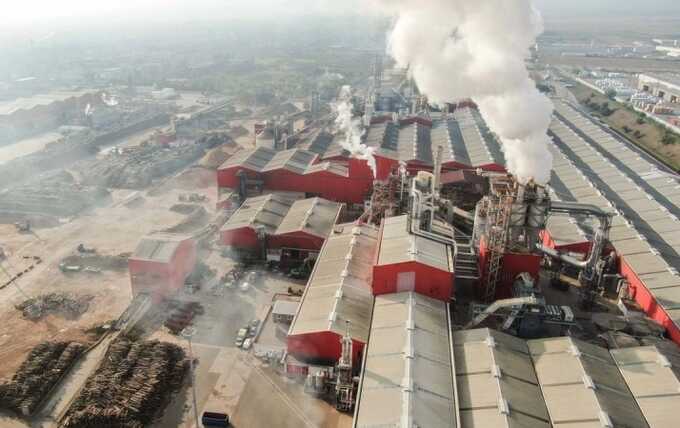Romania investigates Austria’s Kronospan over alleged hazardous waste violations

Romanian authorities recently raided the Austrian wood panel company’s local facilities.
Romanian authorities are investigating the Austrian wood panel producer Kronospan, which is suspected of illegally transporting hazardous waste to Sweden and falsifying environmental emissions reports.
Last week, prosecutors and police raided Kronospan’s facilities in Romania, alleging that the firm falsified monitoring data for emissions from formaldehyde, a carcinogenic compound used in wood products.
According to investigation documents obtained by OCCRP, Kronospan is also accused of shipping 24 tons of hazardous waste to Sweden while labeling it "non-hazardous," which would be illegal under EU environmental regulations.
The allegations are not proven and no charges have been laid. Kronospan’s Romanian office did not respond to questions sent via email, and did not answer phone calls seeking comment.
Kronospan, one of the world’s leading producers of wood panels that are used in residential and commercial buildings, operates two major facilities in Romania. Wood panels produced in Romania are exported throughout Europe.
The investigation documents provide previously-unreported details on the allegations against Kronospan, and how the investigation unfolded.
In 2023, the Romanian National Environmental Guard filed several criminal complaints with prosecutors about Kronospan’s activities.
Investigators from the environmental guard then examined emissions data the company reported in 2022. They discovered repeated use of identical emission figures on different days, raising doubts about the validity of the monitoring reports.
Investigators also reported that certain values appear multiple times with precision to eight decimal places, which is improbable for authentic monitoring data.
Additionally, gaps in recorded emissions data suggested periods when the formaldehyde plant was operational but registered no emissions. For example, on the night of September 26 – 27, 2022, Kronospan’s monitoring system showed no emission data for eight hours while the facility was reportedly active.
Studies show that formaldehyde exposure can lead to myeloid leukemia, which affects blood and bone marrow, as well as cancers of the nasal cavity and sinuses.
Investigators also allege that Kronochem Sebeș, the company’s Romanian subsidiary, labeled hazardous waste as non-hazardous in order to facilitate its transit. The hazardous waste was allegedly transported to Johnson Matthey Formox AB, a Swedish company that provides services and products for manufacturers of formaldehyde.
Johnson Matthey Formox said it had “no comment at this time” in response to questions about the shipment.
According to the investigation documents, Kronospan put the waste under the "Green" list, which includes non-toxic materials like paper and plastic, allowing it to circumvent stringent international protocols for hazardous waste transit.
Authorities believe this misclassification may have expedited the transfer by avoiding notifications and approvals from transit countries.
Under EU law, transferring hazardous waste requires consent from each country involved in the route. In this case, permission was needed from Romania, Hungary, Slovakia, the Czech Republic, Germany, and Sweden.
Over the last decade, members of Romania’s parliament have repeatedly questioned the Ministry of Environment about Kronospan’s activities and formaldehyde use. The ministry has consistently responded that the company’s emissions were within monitored limits.
Read more similar news:
Comments:
comments powered by Disqus

































